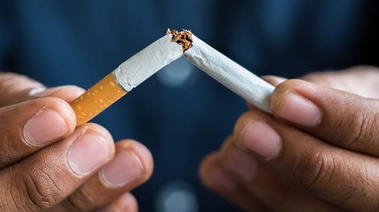If you currently smoke or are trying to quit, you might notice that you are feeling tired more easily. Withdrawal from using cigarettes, vapes and other tobacco products may be the cause of your fatigue, and what’s inside these products could be to blame. When you smoke a cigarette, you inhale an incredibly addictive and toxic substance called nicotine.1 Once your body gets used to nicotine, you may start to feel tired or have trouble sleeping without it.2 Learn more about how nicotine withdrawal can make you tired and why good sleep is important for your health.
How Can Nicotine and Nicotine Withdrawal Affect You?
Smoking can affect your body in many ways. While smoking is commonly known to cause lung problems, the inhaling high levels of nicotine can also negatively affect your heart, increase the risk of developing type 2 diabetes, and cause other cancers as well.1 Nicotine can become a part of your daily routine very quickly, and certain situations such as work breaks and environments where alcohol is consumed can trigger your urge to smoke.1
Even if you haven’t quit nicotine yet, your body may experience withdrawal symptoms during periods of time without smoking, like while you sleep.4 Because nicotine is a highly addictive substance, going without smoking for even a few hours can cause uncomfortable withdrawal symptoms that make it difficult to quit. Nicotine withdrawal consists of physical, mental and emotional symptoms that you feel as nicotine leaves your body.2 Some of these symptoms include nicotine cravings, headaches, nausea, anxiety, frustration, the inability to concentrate and tiredness.2
How Does Nicotine Withdrawal Cause Fatigue?
When nicotine enters your system, it binds to certain receptors in your brain which causes it to release dopamine.2 Dopamine is a chemical that makes you feel good and helps with movement, mood and motivation.3 After nicotine leaves your body, your brain’s receptors are no longer stimulated and less dopamine is released, which lead to nicotine withdrawal symptoms.2 Low dopamine levels may make you feel less motivated, unhappy and tired.3 Nicotine withdrawal symptoms can also occur while you sleep, which may make you feel more restless in the morning.4
Aside from withdrawal symptoms, the use of high levels of nicotine when smoking cigarettes can also cause fatigue in several ways. Nicotine is a stimulant, which may keep you awake.4 Using nicotine within four hours of sleeping can affect the quality of sleep and cause you to wake up in the middle of the night.4 Tobacco use can also lead to sleep apnea, or a condition that causes muscles to collapse in the throat while sleeping.4 Smoke inhalation can irritate the tissues in the nose and throat, which can restrict airflow.4 If you partake in physical activities while smoking, you may also be more at risk for feeling tired. Studies show that smokers get exhausted more quickly during workouts than nonsmokers.5
Will Quitting Smoking Help Me Sleep Better?
Unfortunately, nicotine withdrawal symptoms will occur to some degree in anyone who quits smoking.2 When you first cut back on smoking, it’s normal to experience some trouble sleeping at first.6 As tough as it can be, nicotine withdrawal symptoms don’t last forever and your sleeping troubles will get better over time.6 Once your body gets used to not needing nicotine, your quality of sleep will improve and lead to more restful nights for you.6 Nicotine replacement therapy products can help soothe withdrawal symptoms and make quitting cigarettes easier.2 The small amount of nicotine in these products helps curb your uncomfortable symptoms without exposing you to harmful chemicals found in tobacco products.2
How to Manage Withdrawal Symptoms and Sleep Better
Nicotine withdrawal symptoms can keep you up, but you can manage your urges to help you get the good sleep your body needs. Some helpful ways to manage symptoms include:2,6
-
Physical activity: Using physical activity to keep your body active will help with the symptoms over time. Exercising is also a good way to make you tired and sleep better. Just make sure that you’re not working out right before bedtime, as this can keep you awake.
-
Find ways to relax: When smoking urges come your way, try practicing deep breathing or meditation to allow them to pass.
-
Limit caffeine: Try not to consume any caffeinated beverages such as tea or coffee during the evening. Caffeine can last in your body for longer when you first quit smoking, which can make it harder to sleep.
-
Using nicotine replacement therapy products: Nicotine replacement therapy, or NRT products can help relieve withdrawal symptoms by providing you with a low, therapeutic dose of nicotine. You can try NRT products such as Nicorette Gum or Nicorette Lozenges to help curb your cravings over time. Try not to use NRT products right before bedtime, as the nicotine in them can still disrupt your sleep.
Tips on Sleeping Better
Getting better sleep means feeling less tired throughout the day. If you feel fatigued while experiencing nicotine withdrawal symptoms, prioritizing your sleep can help improve your quality of life. You can get better sleep by trying the following:6
-
Stay away from screens: It’s fun to watch something before going to bed, but the light on your phone or TV screen may have an affect on your sleep. Keep your laptop, TV, phone or tablet off before it’s time to sleep.
-
Make your room easier to sleep in: Keep your room dark, quiet, comfortable and at a temperature that is optimal for sleep.
-
Be consistent with your sleep schedule: Try to sleep and wake up at around the same time every day, even on your days off. Your body will get used to sleeping at a certain time.
Nicotine withdrawal symptoms may be the culprit for your fatigue and poor sleep, which is another reason why it’s important to quit. Find more quit smoking tips on the Nicorette website.






